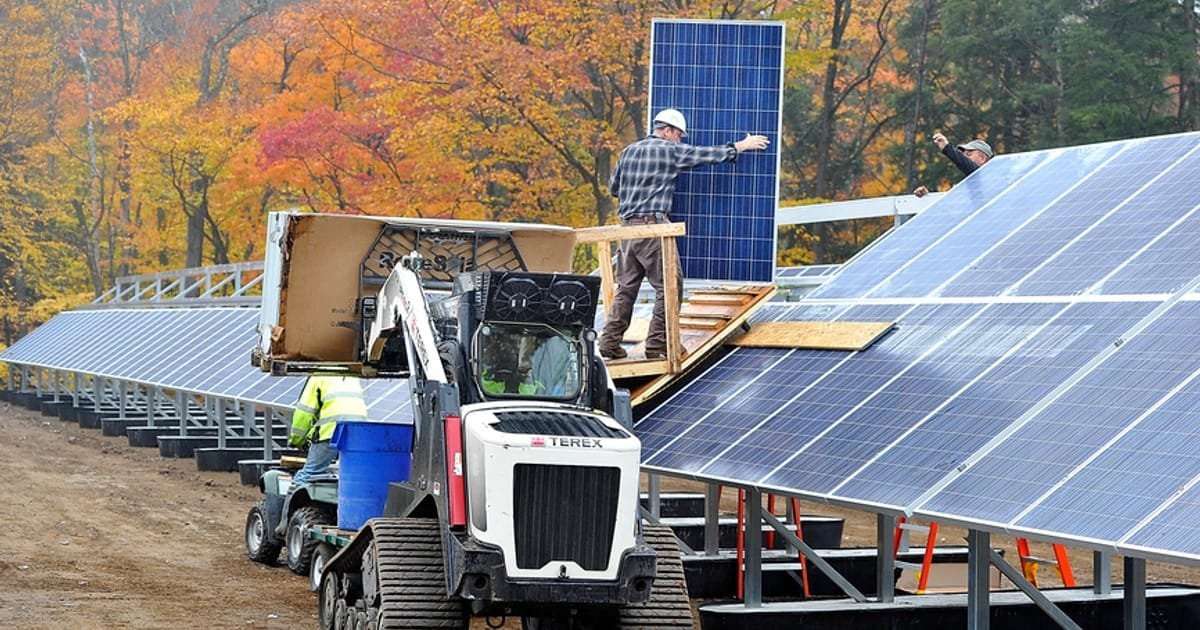The Inflation Reduction Act will create a lot of new construction jobs for people building the electric-vehicle and battery factories and the wind and solar manufacturing and generation projects spurred by the law’s hundreds of billions of dollars in tax credits and incentives.
Plenty more jobs will be created at those sites once construction is complete. And the IRA will spur “indirect” jobs at companies that supply the new facilities with goods and services, as well as “induced” jobs tied to these workers spending their wages within local economies.
So says a new report from E2 (Environmental Entrepreneurs) that tallies employment expected to be triggered by 210 major clean-energy projects announced in the first 12 months after the law’s passage. The analysis finds that these projects will spur a total of 303,500 jobs each year over a typical five-year construction phase, and a total of another 99,600 jobs each year after that in their long-term operations.
Subscribe to receive Canary's latest news
“This report basically reinforces the fact that we’re in the biggest economic revolution in generations, thanks to the IRA and its policies,” said Bob Keefe, executive director of E2, a nonpartisan clean energy advocacy group of business leaders, investors and professionals. “The economic boom extends well beyond solar panels and wind turbines, to everything from local construction companies to restaurants to real estate, and many other sectors of the economy.”
By way of comparison, the 303,500 jobs expected during these projects’ construction phases is roughly equivalent to the total number of firefighters employed across the country, he said. The wages of workers involved in this phase are projected to add up to $111 billion over five years.
The report — compiled by BW Research Partnership, which also produces the annual U.S. Energy & Employment Report for the Department of Energy — forecasts that the jobs associated with these projects will add about $156 billion to the U.S. gross domestic product, boosting GDP by more than half a percent. The projects will also generate more than $32 billion in tax revenue for federal, state and local governments over a five-year period.
The new report builds on a jobs analysis E2 released in August to mark the one-year anniversary of the Inflation Reduction Act. That analysis forecast at least 74,181 new jobs and $86.3 billion in private investments linked to 178 of the 210 announced projects, the ones that included hard numbers on employment and investment.
The new report adds extrapolated job and economic-impact data for the remaining projects.
The E2 report joins a growing number of forecasts and estimates of the employment growth being spurred by the law’s passage. The BlueGreen Alliance, a nonprofit representing labor unions and environmental organizations, commissioned an analysis last year that forecast the Inflation Reduction Act would lead to 9 million new jobs over a decade. Climate Power, a nonprofit climate advocacy group, reported in July that more than 170,000 clean-energy jobs had already been “announced or advanced” thanks to the Inflation Reduction Act and the 2021 Bipartisan Infrastructure Law.
E2’s analysis differs from others because it’s based on “projects we absolutely know are tied to the IRA, either because the companies announce it, or because the credits or grants they’re applying for are specifically” from the law, Keefe said.

rolmega on November 1st, 2023 at 18:19 UTC »
yeah, this is cool and all but i haven't had an interview all year and i think this inflation reduction act is at least partially to blame since i was getting them with regularity in 21 and 22. i feel like i'm being treated with the care of an experimented-upon animal, caught in the gears of ham-fisted monetary policy
Vergenbuurg on November 1st, 2023 at 15:02 UTC »
My goodness, it's almost as if putting financial liquidity in the hands of those who will immediately turn around and invest it back into the economy is... beneficial to the economy.
But, naw, let's keep giving it to the richest assholes who'll instead divert it away and hoard it in a global financial dick-measuring contest where everyone loses.
InsuranceToTheRescue on November 1st, 2023 at 14:32 UTC »
The law is also bringing in high tech manufacturing jobs. Look at the various chip fabs that are being built across the country.